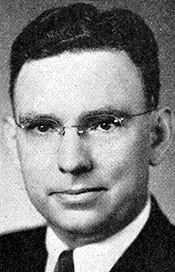Howard Buffett
| Howard Buffett | |
|---|---|
 |
|
| Member of the U.S. House of Representatives from Nebraska's 2nd district |
|
|
In office January 3, 1943 – January 3, 1949 |
|
| Preceded by | Charles F. McLaughlin |
| Succeeded by | Eugene D. O'Sullivan |
| Member of the U.S. House of Representatives from Nebraska's 2nd district |
|
|
In office January 3, 1951 – January 3, 1953 |
|
| Preceded by | Eugene D. O'Sullivan |
| Succeeded by | Roman L. Hruska |
| Personal details | |
| Born |
Howard Horman Buffett August 13, 1903 Omaha, Nebraska, U.S. |
| Died | April 30, 1964 (aged 60) Omaha, Nebraska, U.S. |
| Political party | Republican |
| Spouse(s) | Leila Buffett |
| Children | 3; including Warren Buffett |
| Alma mater | University of Nebraska–Lincoln |
| Occupation | Businessman, politician, investor |
| Religion | Presbyterian |
Howard Homan Buffett (August 13, 1903 – April 30, 1964) was an American businessman, investor, and politician. He was a four-term Republican United States Representative. He was the father of Warren Buffett, a billionaire businessman and investor.
Howard Buffett was born in Omaha, Nebraska to Henrietta Duvall Buffett and Ernest P. Buffett, owners of a grocery business. Henrietta was of Huguenot ancestry. Ernest P. Buffett's paternal ancestors hail from northern Scandinavia. Howard Buffett attended public schools and graduated from the University of Nebraska in Lincoln, Nebraska in 1925. While a student, Buffett was a brother of the Alpha Sigma Phi Fraternity. He married Leila Stahl on December 27, 1925. The Buffetts were active members of Dundee Presbyterian Church. After failing to secure a job in the family grocery business, he started a small stock brokerage.
Entering the investment business, Buffett also served on the Omaha board of education from 1939 to 1942. In 1942 he ran for the U.S. House of Representatives in the Nebraska district in which Omaha was located. In that election, Buffett was seen as "a Republican sacrificial lamb in Nebraska’s second district when FDR was a popular wartime leader." Nevertheless, he went on to win the Republican nomination in the primary and then the subsequent general election.
...
Wikipedia
